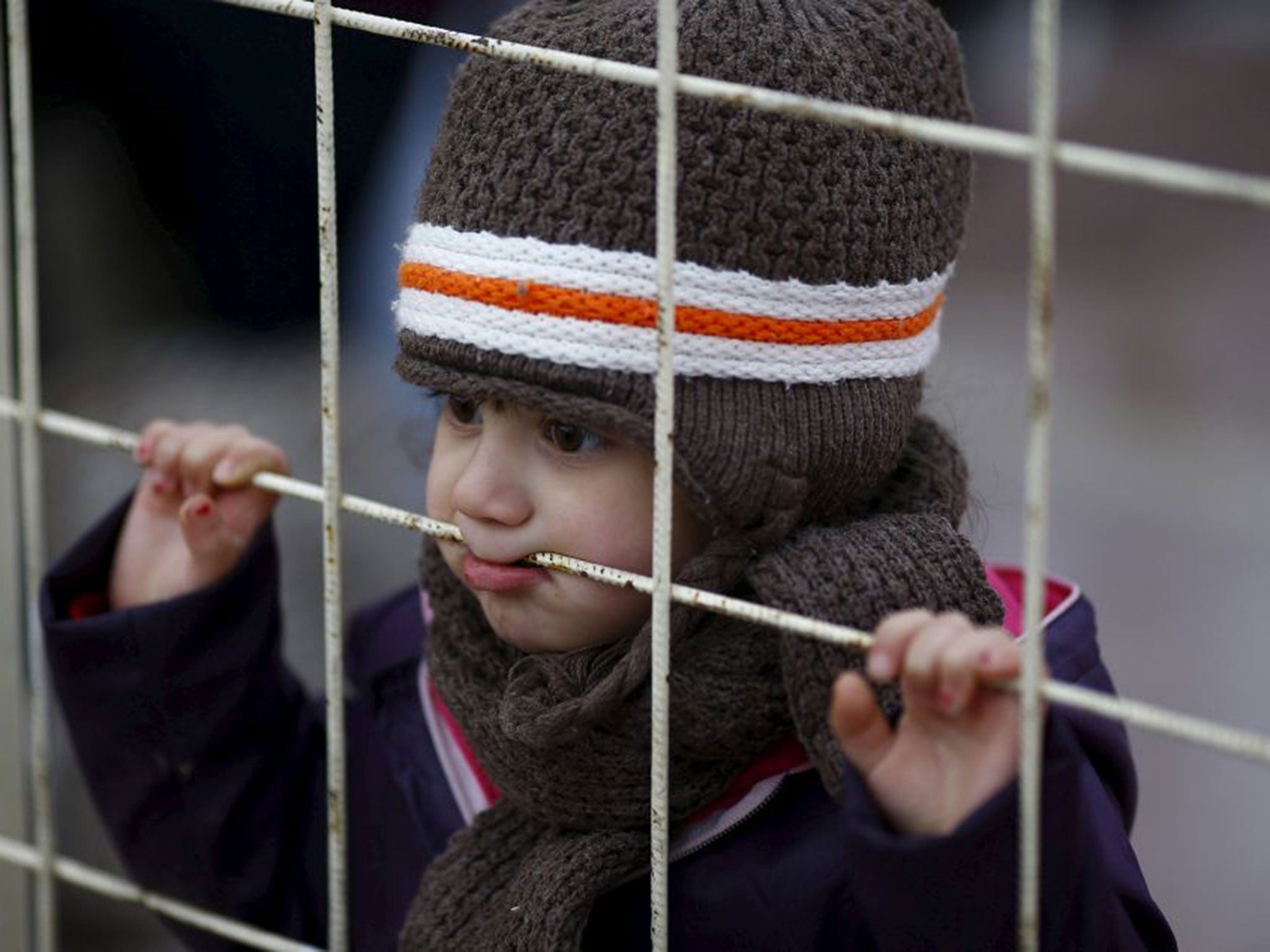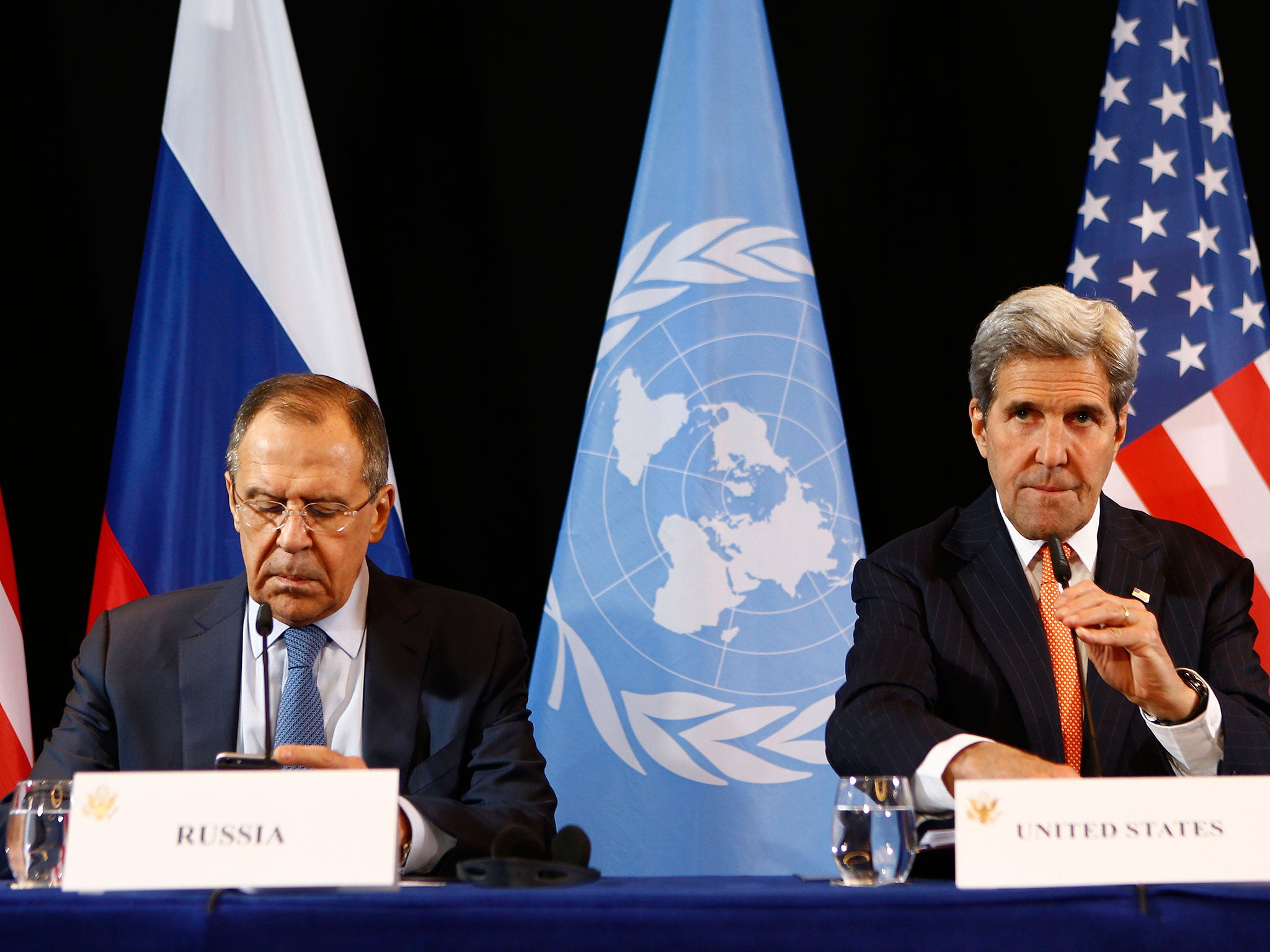Syria civil war: World powers agree 'cessation of hostilities' in a week's time
US Secretary of State John Kerry said all nations involved in the Munich talks agreed negotiations should resume in Geneva as soon as possible

Your support helps us to tell the story
From reproductive rights to climate change to Big Tech, The Independent is on the ground when the story is developing. Whether it's investigating the financials of Elon Musk's pro-Trump PAC or producing our latest documentary, 'The A Word', which shines a light on the American women fighting for reproductive rights, we know how important it is to parse out the facts from the messaging.
At such a critical moment in US history, we need reporters on the ground. Your donation allows us to keep sending journalists to speak to both sides of the story.
The Independent is trusted by Americans across the entire political spectrum. And unlike many other quality news outlets, we choose not to lock Americans out of our reporting and analysis with paywalls. We believe quality journalism should be available to everyone, paid for by those who can afford it.
Your support makes all the difference.The people of Syria have been handed a glimmer of hope after world powers agreed to seek a nationawide “cessation of hostilities” within a week.
US Secretary of State John Kerry told reporters in Munich that Syrian peace negotiations should resume in Geneva as soon as possible. He said that the cessation in hostilities would not include Western operations against Isis and other miliant groups fighting in Syria.
Mr Kerry said the ceasefire plan was “ambitious” and said the real test would be whether the parties honoured the commitments.
America's top diplomat, flanked by Russian Foreign Minister Sergei Lavrov and UN envoy Staffan de Mistura, acknowledged that the meeting produced commitments on paper only. He and Mr Lavrov agreed that the “real test” will be whether all parties to the Syrian conflict honor those commitments.
“What we have here are words on paper, what we need to see in the next few days are actions on the ground,” he said.
A UN task force will be set up to ensure humanitarian access is granted to all sides, Mr Kerry added. He also said the powers had agreed to immediately accelerate and expand the delivery of humanitarian aid.
Mr Lavrov said there were “reasons to hope we have done a great job today”.

British Foreign Secretary Philip Hammond said a cessation of hostilities in Syria could only succeed if Russia stops air strikes supporting Syrian government forces' advance against the opposition.
“If implemented fully and properly... , this (deal) will be an important step towards relieving the killing and suffering in Syria,” Mr Hammond said in a statement.
“But it will only succeed if there is a major change of behaviour by the Syrian regime and its supporters. Russia, in particular, claims to be attacking terrorist groups and yet consistently bombs non-extremist groups including civilians. If this agreement is to work, this bombing will have to stop: no cessation of hostilities will last if moderate opposition groups continue to be targeted.”
The announcement comes as the Syrian army, backed by Russian air strikes, made further advances in Aleppo province. The move threatens to encircle tens of thousands of civilians in rebel-held parts of the major city of Aleppo.
At the press conference Mr Kerry again suggested that Russian strikes were targeting opposition forces, rather than mililiants, as Moscow says.
One Western diplomatic source told Reuters: "We did not get a deal on the immediate end of Russian bombings, but we have a commitment to a process that if it works would change the situation.”
Russian Prime Minister Dmitry Medvedev on Thursday raised the spectre of an interminable conflict or even a world war if powers failed to negotiate an end to the fighting in Syria, which has killed 250,000 people, caused a refugee crisis and empowered Islamic State militants.
The first peace talks in two years between belligerents in Syria collapsed last week before they began in the face an the offensive by President Bashar al-Assad's forces, one of the biggest and most consequential of the five-year war.
As Mr Kerry met with the Syria group in Munich, US Defence Secretary Ash Carter was in Brussels to rally fresh support for the fight against the Islamic State group in largely the same territory.
Mr Carter said defense ministers from more than two dozen countries gave a “broad endorsement” of a refined US plan for defeating Isis. After a meeting at NATO headquarters, Mr Carter told reporters that nearly all participants either promised new military commitments or said their governments would consider new contributions. He predicted “tangible gains” in Iraq and Syria by March.
“We will all look back after victory and remember who participated in the fight,” he said, appealing to coalition partners to expand and deepen their military contributions.
Statement of the International Syria Support Group:
Meeting in Munich on February 11 & 12, 2016, as the International Syria Support Group (ISSG), the Arab League, China, Egypt, the EU, France, Germany, Iran, Iraq, Italy, Jordan, Lebanon, the Organization of Islamic Cooperation, Oman, Qatar, Russia, Saudi Arabia, Turkey, United Arab Emirates, the United Kingdom, the United Nations, and the United States decided that humanitarian access will commence this week to besieged areas, and an ISSG task force will within one week elaborate modalities for a nationwide cessation of hostilities.
The ISSG members unanimously committed to immediately facilitate the full implementation of the UN Security Council Resolution 2254, adopted unanimously December 18, 2015. The ISSG reaffirmed their readiness to carry out all commitments set forth in the resolution, including to: ensure a Syrian-led and Syrian-owned political transition based on the Geneva Communiqué in its entirety; press for the end of any indiscriminate use of weapons; support and accelerate the agreement and implementation of a nationwide ceasefire; facilitate immediate humanitarian access to besieged and hard-to-reach areas and the release of any arbitrarily detained persons; and fight terrorism.
Ensuring Humanitarian Access
In order to accelerate the urgent delivery of humanitarian aid, sustained delivery of assistance shall begin this week by air to Deir Ez Zour and simultaneously to Fouah, Kafrayah, the besieged areas of Rural Damascus, Madaya, Mouadhimiyeh, and Kafr Batna by land, and continue as long as humanitarian needs persist. Humanitarian access to these most urgent areas will be a first step toward full, sustained, and unimpeded access throughout the country
The members of the ISSG will use their influence with all parties on the ground to work together, in coordination with the United Nations, to ensure that all parties allow immediate and sustained humanitarian access to reach all people in need, throughout Syria, particularly in all besieged and hard-to-reach areas, as called for in UNSCR 2254. To this end, the UN will submit a plan to an ISSG humanitarian task force, which shall convene on February 12 and next week. This group will comprise the ISSG co-chairs, relevant UN entities and members of the ISSG with influence on the parties in a position to ensure humanitarian access. The ISSG reaffirmed that humanitarian access should not benefit any particular group over any other, but shall be granted by all sides to all people in need, in full compliance with UNSCR 2254 and international humanitarian law. The ISSG asks the UN to report weekly, on behalf of the task force, on progress on the implementation of the plan referenced above, so that in any cases where access lags or approvals are lacking, relevant ISSG members will use their influence to press the requested party/parties to provide that approval. There will be a process for resolving any problems so that relief can flow expeditiously. Any questions about access or delivery will be resolved through the task force. All ISSG members commit to immediately work together with the Syrian parties to ensure no delay in the granting of approval and completion of all pending UN requests for access in accordance with UNSCR 2254, paragraph 12.
ISSG co-chairs and members will ensure that aid convoys are used solely for humanitarian purposes. International humanitarian organizations, in particular the United Nations, will play the central role, as they engage the Syrian government, the opposition and local populations, in arranging
the monitoring and sustained and uninterrupted distribution of aid.
Achieving a Nationwide Cessation of Hostilities
The ISSG members agreed that a nationwide cessation of hostilities must be urgently implemented, and should apply to any party currently engaged in military or paramilitary hostilities against any other parties other than Daesh, Jabhat al-Nusra, or other groups designated as terrorist organizations by the United Nations Security Council. The ISSG members commit to exercise influence for an immediate and significant reduction in violence leading to the nationwide cessation of hostilities.
The ISSG members decided to take immediate steps to secure the full support of all parties to the conflict for a cessation of hostilities, and in furtherance of that have established an ISSG ceasefire task force, under the auspices of the UN, co-chaired by Russia and the United States, and including political and military officials, with the participation of ISSG members with influence on the armed opposition groups or forces fighting in support of the Syrian government. The UN shall serve as the secretariat of the ceasefire task force. The cessation of hostilities will commence in one week, after confirmation by the Syrian government and opposition, following appropriate consultations in Syria. During that week, the ISSG task force will develop modalities for the cessation of hostilities.
The ISSG task force will, among other responsibilities continue to: a) delineate the territory held by Daesh, ANF and other groups designated as terrorist organizations by the United Nations Security Council; b) ensure effective communications among all parties to promote compliance and rapidly de-escalate tensions; c) resolve allegations of non-compliance; and d) refer persistent non-compliant behavior by any of the parties to ISSG
Ministers, or those designated by the Ministers, to determine appropriate action, including the exclusion of such parties from the arrangements for the cessation of hostilities and the protection it affords them. Although a cessation of hostilities can facilitate humanitarian access, it cannot be a precondition for such access anywhere in Syria. The ISSG decided that all members will undertake their best efforts, in good faith, to sustain the cessation of hostilities and delivery of humanitarian assistance, and take measures to stop any activities prohibited by United Nations Security Council Resolutions 2170, 2178, 2199, 2249, 2253, and 2254. The ISSG again expressed concern for the plight of refugees and internally displaced persons and the imperative of building conditions for their safe return in accordance with the norms of international humanitarian law and taking into account the interests of host countries.
Advancing a Political Transition
The members of the ISSG reaffirmed the imperative of all sides engaging in negotiations under the auspices of the United Nations as soon as possible, in strict compliance with United Nations Security Council 2254. They reaffirmed that it is for the Syrian people to decide the future of Syria. The members of the ISSG pledge to do all they can to facilitate rapid progress in these negotiations, including the reaching of agreement within six months on a political transition plan that establishes credible, inclusive and non-sectarian governance and sets a schedule and process for drafting a new constitution, free and fair elections, pursuant to the new constitution, to be held within 18 months and administered under supervision of the United Nations, to the satisfaction of the governance and to the highest international standards of transparency and accountability, with all Syrians, including members of the diaspora, eligible to participate. Full implementation of these objectives will require the ISSG co-chairs and members, the UN and others, to work closely on political, humanitarian, and military dimensions.
Join our commenting forum
Join thought-provoking conversations, follow other Independent readers and see their replies
Comments